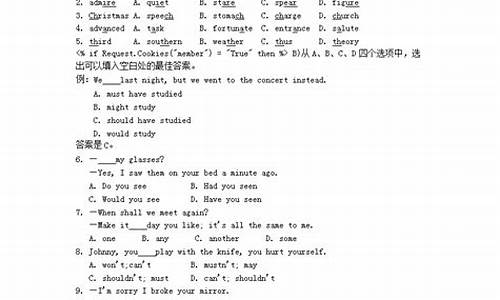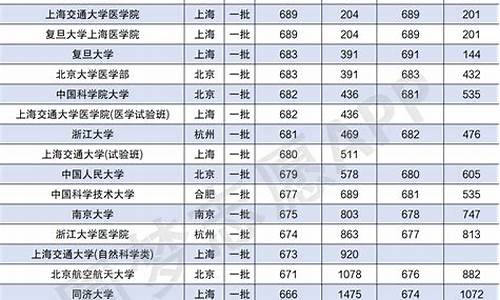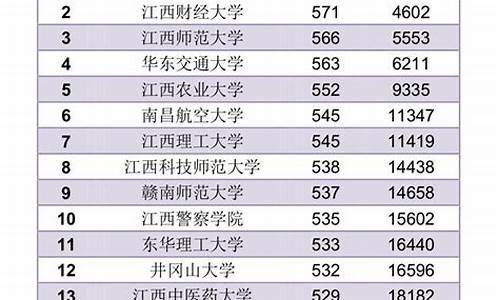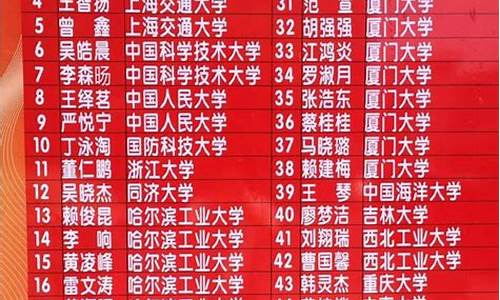2017高考英语安徽,2017年安徽高考英语试卷及答案分析
1.高考英语3500词详解
2.2017高考英语动词不定式专项知识点
3.安徽2023高考用的什么卷
4.2017高考英语词汇详解:arrange的用法
5.2017年全国高考哪些省是全国卷

2023安徽高考英语试题难度适中。
2023年安徽高考英语试题难度较为适中,安徽高考英语试卷是全国乙卷。安徽高考英语试题语法考察方面,更为全面地考察容易被忽略的细节考点,明年的安徽考生在备考时要注意考点覆盖的全面性,特别要关注尚未在今年安徽高考英语试题中涉及的语法知识。
安徽高考英语试题目前的考察趋势,越来越脱离教条主义的死记硬背,对学生处理生活场景,理解文化现象等能力提出了更高的要求。安徽高考英语试题需要我们立足但不局限于课本,对词汇多维度的含义进行理解,并且熟悉热点话题和现象,提高对不同语境不同领域话题的适应能力。
安徽高考英语试题的命题,聚焦关键能力考查,注重学生英语语言的全面发展,加大学以致用和活学活用的结合力度。
此外,安徽高考英语试题从日常生活、生产实践、科学研究中广泛选材创设情境,考查学生分析解决实际问题的能力,鼓励学生运用创造性、发散性思维多角度分析解决问题,激发学生创新意识,引导实现从“解题”到“解决问题”的转变。
试题起点较低,层次分明,难易适中,整卷阶梯明显,有主要考查1个考点的简单题目,也有考查了多个考点的复杂题目,较复杂的题目又搭建了台阶,让考生易于入手,对不同层次的考生都有较好的区分度。这些题目既考查了学生进一步学习物理所必备的基础知识,同时又能考查学生学习物理的基本素养。
从出题角度来讲,如果部分考生觉着难,部分觉着不难,说明出题目的达到了,很好的区分了高分生和低分生,高分生毕竟是少部分。这样,更有利于名校选拔人才。
高考英语3500词详解
安徽高考投档分数线如下:
文史类本科一批495分,本科二批440分,高职(专科)批200分;理工类本科一批482分,本科二批427分,高职(专科)批200分。
高考模式
2023安徽高考模式是“3+文科综合/理科综合”的模式。各考6个学科,4种试卷,即报考文科的学生考:语文、数学、英语和文科综合,报考理工科的学生考:语文、数学、英语和理科综合。
2023年安徽高考用的是全国乙卷。按照教育部部署要求,从2020级起,相关年级各学科教学及高考命题均依据《普通高中课程方案和语文等学科课程标准(2017年版2020年修订)》,数学高考不分文理科。语、数、英试卷结构参考新高考全国卷;理科综合、文科综合试卷结构参考老高考全国卷,不设选考题。
2023安徽高考难度
相较于其他的省份来说,安徽省的高考难度是很大的。根据以往的经验,安徽高考难度全国排名第5名,属于中等偏上难度。
从报考人数上看。2022年全省高考报名考生共60.1万人,比上年增加6万人。预计2023年高考人数61-62万人,高考竞争及难度将进一步增大。
从试卷难度上看。近几年,安徽高考试题类型相对特别灵活,在考查学生学习能力的同时,更考查学生对知识的应用能力,既考查学生的基本功,又考查学生随机应变的能力,因此,整体来看,未来一段时间安徽高考难度不会有太大的变化。
高考注意事项
身份证、准考证、黑色签字笔、2B铅笔、橡皮擦、尺子等,并且最好准备至少两份,避免因为用品损坏而影响考试发挥,另外可以准备透明考试袋,把所有物品放置其中。
2017高考英语动词不定式专项知识点
2017高考英语3500词详解
在高考中要想取得优异成绩,必须学好词汇。为了帮助大家,下面我整理了高考英语3500词以N开头的词汇,希望能帮到大家!
高考英语3500词N
1.name n. 名字,名气 v. 命名
She first made her name as a writer of children?s books. 出名 enjoy a good name 享有盛名 by name 用名字 She asked for you by name. by the name of=named? 名叫?的 in God?s/Heaven?s name=in the name of God/Heaven 究竟,到底,看在上帝的份上
in the name of? 为? ,再?名下 be named after 取名
a boy named?/naming himself? 名叫 name him (as) captain 任命
namely =that is? 即,也就是说?
2./narrowly adj./adv. 狭窄的,勉强的, v. 缩小 a narrow victory 险胜
be beaten narrowly 差点儿,以毫厘之差 She has a very narrow view of the world. 狭隘的 She escaped injury narrowly. 险些 in the narrow/broad sense 狭义/广义上
3. native adj. 出生的,当地的 n. 当地人 my native language-mother tongue 母语
The tiger is native to India. 原产于 a native of London 当地人
4./almost adv. 几乎,差不多 I have worked here for nearly 10 years.
almost everyone 几乎所有人 not nearly=much less than=not at all=far from 远非,绝不是 There isn?t nearly enough time to get there now.
5. necessary adj. 必要的,必须的 It is necessary for sb. to do?
If (it is) necessary, you can call on me. It is necessary that ?(should)?
6. neck n. 颈,脖子 neck and neck (with?) 比赛中势均力敌,不分上下
a round-necked sweater 一件圆领毛衣
7. need v./n. 需要 They badly need a change.
There is no need for sb. to do/have no need to do? 没有必要做?
There is no need for you to get up early tomorrow.
I have no need to open the letter. in need of 需要
if need be=if necessary 如果有必要/需要
There is always food in the freezer if need be. I am in need of some fresh air.
8. neither pron. 两者都不
They produced two reports, neither of which contained any useful suggestions.
neither?nor? 既不?也不? either?or? 或?或?
9. noise n. 噪音 We had to shout above the noise of traffic. noisy adj.
voice n. 嗓音 in a low/high voice 高声地/低声的.; She has a good voice.
sound n. 声音 Light travels much faster than sound. adj. 正常的 n. 正常 normally adv.
It?s normal to feel tired after such a long trip.
normal temperature above /below normal
return to normal/get back to normal 恢复正常 common常见的,共同的
a common mistake常见错误;common sense常识;common practice 习惯做法
ordinary 普通的(average) ordinary-looking 相貌平平的
usual 通常的 as usual 和往常一样 than usual 比往常更
11. nose n. 鼻子 a running/runny nose 流鼻涕的鼻子
12. nothing pron. 没有什么 for nothing=for free 免费的 have nothing to do with
nothing but=just 仅仅,只不过 I want nothing but the best for my children.
anything but 绝不 The hotel was anything but cheap. 不可靠,不真实 There is nothing to it.=It?s very easy.
注意 v. 注意到 take notice of=pay attention to 注意
Don?t take any notice of what you read in the papers.
come to my notice 让我看到 put up a notice 公告,通知 另行通知 notice sb/sth. do/doing/done 既然 Now that the guests left ,we?ve got a lot of extra space.
(every) now and then/again=from time to time 不时地 It is now or never. 机不可失 无处 go/get no where/get sb. nowhere 毫无进展
The discussion got nowhere this morning.
nowhere to be found/seen/in sight 不可能找到 My ticket is nowhere to be found.
Nowhere in the world other than Britain can you experience four seasons in a single day.
;安徽2023高考用的什么卷
1 不定式作宾语
1) 动词+ 不定式
afford, aim, appear, agree, arrange, ask, be, decide, bother, care, choose, come, dare, demand, desire, determine, expect, elect, endeavor, hope, fail, happen, help, hesitate, learn, long, mean, manage, offer, ought, plan, prepare, pretend, promise, refuse, seem, tend, wait, wish, undertake
The driver failed to see the other car in time. 司机没能及时看见另一辆车。
I happen to know the answer to your question. 我碰巧知道你那道问题的答案。
2) 动词+不定式;动词+宾语+不定式
ask, beg, choose, expect, hate, help intend like, love, need prefer, prepare, promise, want, wish
I like to keep everything tidy. 我喜欢每件东西都保持整洁。
I like you to keep everything tidy. 我喜欢你使每件东西都保持整洁。
I want to speak to Tom. 我想和汤姆谈话。
I want you to speak to Tom. 我想让你和汤姆谈话。
3) 动词+疑问词+ to
decide, know, consider forget, learn, remember, show, understand, see, wonder, hear, find out, explain, tell
Please show us how to do that. 请演示给我们如何去做。
There are so many kinds of tape-recorders on sale that I can't make up my mind which to buy.有这么多的录音机,我都拿不定主意买哪一种。
注意
疑问词带不定式在句中作成分时,谓语动词用单数。如:The question is how to put it into practice. 问题是怎样把它付诸实施。
2. 不定式作补语
1) 动词+宾语+不定式(to do)
advise, allow, appoint, believe, cause, challenge, command, compel, consider, declare, drive, enable, encourage, find, forbid, force, guess, hire, imagine, impel, induce, inform, instruct, invite, judge, know, like, order, permit, persuade, remind, report, request, require, select, send, state, suppose, tell, think, train, trust, understand, urge, warn
a.Father will not allow us to play on the street. 父亲不让我们在街上玩耍。
b.We believe him to be guilty. 我们相信他是有罪的。
Find 的特殊用法
Find 后可用分词做宾补,或先加形式宾语,再加形容词,最后加带to 的动词不定式。find后也可带一个从句。此类动词还有get,have。
I found him lying on the ground.
I found it important to learn.
I found that to learn English is important.
典型例题
The next morning she found the man ___ in bed,dead.
A. lying B. lie C. lay D. laying
答案:A.find的宾语后面,用分词或分词短语,起宾语补足语作用。现在分词表达主动,也表达正在进行,过去分词表达被动。
2) to + be 的不定式结构,作补语的动词。
acknowledge, believe, consider, think, declare(声称), discover, fancy(设想), feel, find, guess, judge, imagine, know, prove, see(理解), show, suppose, take(以为), understand
We consider Tom to be one of the best students in our class. 我们认为汤姆是班上的学生之一。
典型例题
Charles Babbage is generally considered ___ the first computer.
A. to invent B. inventing C. to have invented D. having invented
答案:A. 由consider to do sth. 排除B、D。. 此句只说明发明这一个事实,不定式后用原形即可。而C为现在完成时,发明为点动词一般不用完成时,且此处也不强调对现在的影响,因此不选C。
3) to be +形容词
seem, appear, be said, be supposed, be believed, be thought, be known, be reported, hope, wish, desire, want, plan, expect, mean
The book is believed to be uninteresting. 人们认为这本书没什么意思。
4) there be+不定式
believe, expect, intend, like, love, mean, prefer, want, wish, undrstand
We didn't expect there to be so many people there. 我们没料到会有那么多人在哪里。 注意
有些动词需用as 短语做补语,如regard, think believe, take, consider.
We regard Tom as our best teacher. 我们认为汤姆是我们的老师。
Mary took him as her father . 玛丽把他当作自己的父亲。
3. 不定式作主语
1) It's easy (for me) to do that. 我做这事太容易了。
easy, difficult, hard, important, possible, impossible, comfortable, necessary, better; the first, the next, the last, the best, too much, too little, not enough
It's so nice to hear your voice. 听到你的声音真高兴。
It's necessary for you to lock the car when you do not use it. 当你不用车的时候,锁车是有必要的。
2) It's very kind of you to help us. 他帮助我们,他真好。
kind, nice, stupid, rude, clever, foolish, thoughtful, thoughtless, brave, considerate(考虑周到的), silly, selfish(自私的)
It was silly of us to believe him. 我们真愚蠢,竟然相信了他。
It seemed selfish of him not to give them anything. 他不给他们任何东西,这显得太自私了。 注意
1) 其他系动词如,look,appear等也可用于此句型
2) 不定式作为句子成分时,动词用单数形式。
3) 当不定式作主语的句子中又有一个不定式作表语时,不能用It is? to?的句型
(对)To see is to believe. 百闻不如一见。(错)It is to believe to see.
It's for sb.和 It's of sb.
1) for sb. 常用于表示事物的特征特点,表示客观形式的形容词,如easy, hard, difficult, interesting, impossible等:
It's very hard for him to study two languages. 对他来说学两门外语是很难的。
2) of sb的句型一般用表示人物的性格,品德,表示主观感情或态度的形容词,如good, kind, nice, clever, foolish, right。
It's very nice of you to help me. 你来帮助我,你真是太好了。
for 与of 的辨别方法
用介词后面的代词作主语,用介词前边的形容词作表语,造个句子。如果道理上通顺用of,不通则用for。如:You are nice. (通顺,所以应用of)。He is hard. (人是困难的,不通,因此应用for。)
4. 不定式作表语
不定式可放在be动词后面,形成表语。例如:
My work is to clean the room every day.
His dream is to be a doctor.
5. 不定式作定语
不定式做定语通常要放在被修饰的词后。例如:
I have a lot of work to do.
So he made some candles to give light.
6. 不定式作状语
1) 目的状语
To? only to (仅仅为了), in order to, so as to, so(such)? as to? (如此?以便?) He ran so fast as to catch the first bus. 他飞快地跑以便赶上第一班车。
I come here only to say good-bye to you. 我来仅仅是向你告别。
2) 作结果状语,表事先没有预料到的,要放在句子后面。
What have I said to make you angry.
He searched the room only to find nothing.
3) 表原因
I'm glad to see you.
典型例题
The chair looks rather hard, but in fact it is very comfortable to ___.
A. sit B. sit on C. be seat D. be sat on
答案:B. 如果不定式为不及物动词,其后应有必要的介词。当动词与介词连用时,常位于"形容词+动词不定式"结构的末尾。
用作介词的to
to 有两种用法:一为不定式+动词原形; 一为介词+名词/动名词, to 在下面的用法中是第二种,即to+ 名词/动名词:admit to承认,confess to承认,be accustomed to 习惯于,be used to 习惯于,stick to 坚持,turn to开始,着手于,devote oneself to 献身于,be devoted to 致力于, look forward to 盼望,pay attention to
注意
省to 的动词不定式
1) 情态动词 ( 除ought 外,ought to):
2) 使役动词 let, have, make:
3) 感官动词 see, watch, look at, notice , observe, hear, listen to, smell, feel, find 等后作宾补,省略to。
注意
在被动语态中则to 不能省掉。
I saw him dance. =He was seen to dance.
The boss made them work the whole night.=They were made to work the whole night.
4) would rather,had better:
5) Why? / why not?:
6) help 可带to,也可不带to, help sb (to) do sth:
7) but和except:but前是动词do时,后面出现的动词用不带to的动词不定式。
8) 由and, or和than连接的两个不定式,第二个to 可以省去:
9) 通常在discover, imagine, suppose, think, understand等词后,可以省去to be:He is supposed (to be) nice. 他应该是个好人。举例:He wants to move to France and marry the girl. He wants to do nothing but go out. 比较:He wants to do nothing but go out. He wants to believe anything but to take the medicine.
典型例题
1) ---- I usually go there by train.
---- Why not ___ by boat for a change?
A. to try going B. trying to go C. to try and go D. try going
答案:D. why not 后面接不带to 的不定式,因此选D。
2) Paul doesn't have to be made ___. He always works hard.
A. learn B. to learn C. learned D. learning
答案:B. make后接不带to 的动词不定式,当其用于被动时,to 不可省略。
动词不定式的否定式
Tell him not to shut the window?
She pretended not to see me when I passed by. 我走过的时候,她假装没看见。
典型例题
1) Tell him ___ the window.
A. to shut not B. not to shut C. to not shut D. not shut
答案:B。 tell sb to do sth 的否定形式为tell sb not to do sth.
2) She pretended ___ me when I passed by.
A. not to see B. not seeing C. to not see D. having not seen
答案:A。 pretend 后应接不定式。其否定形式为pretend not to do sth.。
3) Mrs. Smith warned her daughter ___ after drinking.
A. never to drive B. to never driver C. never driving D. never drive
答案:A。warn sb to do sth. 的否定形式为warn sb not to do sth. 此处用的是否定词never.
4) The boy wanted to ride his bicycle in the street,but his mother told him ____.
A. not to B. not to do C. not do it D. do not to
答案:A。not to 为not to do it 的省略形式。可以只用to这个词,而不必重复整个不定式词组。及物动词do后应有名词、代词等,否则不对,因此B,D不对。
5) The patient was warned ___ oily food after the operation.
A. to eat no B. eating not C. not to eat D. not eating
答案:C。warn一词要求后用不定式,此处为不定式的被动,否定形式为be warned not to do。 不定式的特殊句型too?to?
1) too?to 太?以至于?
He is too excited to speak. 他太激动了,说不出话来。
---- Can I help you ? 需要我帮忙吗?
---- Well, I'm afraid the box is too heavy for you to carry it, but thank you all the same. 不用了。这箱子太重,恐怕你搬不动。谢谢您。
2) 如在too前有否定词,则整个句子用否定词表达肯定, too 后那个词表达一种委婉含义,意 为"不太"。
It's never too late to mend. (谚语) 改过不嫌晚。
3) 当too 前面有only, all, but时,意思是:非常? 等于very。
I'm only too pleased to be able to help you. 我非常高兴能帮助你。
He was but too eager to get home. 他非常想回家。
不定式的特殊句型so as to
1) 表示目的;它的否定式是so as not to do。
Tom kept quiet about the accident so as not to lose his job. 汤姆对事故保持沉默是为了不丢掉他的工作。
Go in quietly so as not to wake the baby. 轻点进去,别惊醒了婴儿。
2) so kind as to ---劳驾
Would you be so kind as to tell me the time? 劳驾,现在几点了。
不定式的特殊句型Why not
"Why not +动词原形"表达向某人提出建议,翻译为:"为什么不" "干吗不"
例如:Why not take a holiday? 干吗不去度假?
2017高考英语词汇详解:arrange的用法
2023年安徽高考使用全国乙卷,即全国Ⅰ卷。
扩展资料:
安徽省普通高校招生全国统一考试统考科目为:3+文科综合/理科综合。“3”指语文、数学和外语三个科目,其中数学分为文科数学和理科数学;“文科综合”包括思想政治、历史和地理学科;“理科综合”包括物理、化学和生物学科。
语文、数学(文、理)、外语(含听力)各科满分均为150分,综合科目满分为300分,文化课总分的满分值为750分。
2023年使用全国乙卷的省份:河南、山西、内蒙古、黑龙江、江西、安徽、甘肃、青海、吉林、宁夏、新疆、陕西。
按照教育部部署要求,从2020级起,相关年级各学科教学及高考命题均依据《普通高中课程方案和语文等学科课程标准(2017年版2020年修订)》,数学高考不分文理科。语、数、英试卷结构参考新高考全国卷;理科综合、文科综合试卷结构参考老高考全国卷,不设选考题。
高考全甲卷和乙卷有什么不同:
1、乙卷难度比甲卷高。乙卷英语和物理科目能够明显看出来比甲卷难,不过一些学生会觉得甲卷更难一些,这根据学生学习的大体程度去判断。不过乙卷和甲卷都会在高考中使用。
2、乙卷和甲卷使用的省份不同。乙卷使用的省区:山西、河北、河南、安徽、湖北、湖南、江西、福建等等;甲卷使用的省区:陕西、重庆、青海、新疆、吉林、辽宁、内蒙古等等。
3、乙卷和甲卷里面的科目内容也不同。乙卷科目:英语和综合;甲卷科目:数学、语文、英语。高考试题全国卷简称全国卷,教育部考试中心组织命制的、适用于全国大部分省区的高考试卷,目的在于保证人才选拔的公正性。
由于国家在不断转换教育方向,所以甲卷和乙卷地区和科目上面有明显的变动,不过难易程度这一说法,只要学生们说的算,除了甲卷和乙卷以外,还有丙卷的存在,只是丙卷所包含的省区并不多,许多人都会选择忽略。
2017年全国高考哪些省是全国卷
高考英语词汇详解:arrange的用法
1. 表示“安排”,注意以下用法:
①用作及物动词。如:
a) 用名词或代词作宾语。如:
We will arrange everything. 你们会安排好一切的。
I’ve arranged a taxi for you. 我已为你们安排了一辆出租车。
有时用于被动语态。如:
It is all arranged. 这事全都安排好了。
b) 用不定式作宾语。如:
They arranged to start early. 他们计划一早出发。
I’ve arranged to see them tonight. 我已安排今晚同他们见面。
We still have to arrange how to go there. 我们还得安排如何去那儿。
表示“安排某人做某事”,不能用 arrange sb to do sth, 而应用 arrange for sb to do sth 。
c) 用 that 从句作宾语。如:
We have arranged that she look after the children. 我们已安排她照看孩子。
They arranged that the meeting be put off to Saturday. 他们安排把会议推迟到星期六。
d) 不接双宾语。如:
请给我们安排一次与工人的会见。
正:Please arrange an interview with the workers for us.
误:Please arrange us an interview with the workers.
②用作不及物动词。如:
We must arrange about that. 我们须对此事作出安排。
Call up and arrange a taxi,please. 请打电话安排一辆出租车。
Let’s go and arrange with them about it. 我们去和他们把这事安排一下。
Let’s try and arrange so that we can get there in time. 我们设法安排一下,以便能及时赶到。
用作不及物动词时,还通常用于 arrange for sb to do sth。如:
He’s arranged for me to attend the meeting. 他已安排我去参加会议。
We have arranged for the car to come at nine. 我们已安排好让汽车9点钟来。
比较以下同义句型。如:
我们安排把会议推迟一周后召开。
正:We arranged for the meeting to be put off for a week.
正:We arranged that the meeting be put off for a week.
2. 表示“整理”、“排列”,是及物动词。如:
They were arranged in kinds . 他们是按种类排列的。
We must arrange the room before the guests arrive. 在客人到来之前我们必须把房间整理好。
全国乙卷(新课标一卷)
2015年以前使用省份:河南 河北 山西 陕西(语文及综合)湖北(综合)江西(综合)湖南(综合)
2015年增加使用省份:江西(语文 数学 英语)、山东(英语)
2016年增加省份:湖南(语文 数学 英语 综合)、湖北(语文 数学 英语)、广东、福建、安徽 、山东(综合);取消省份:陕西
2017年增加省份:浙江(英语)
2018年高考增加使用新课标一卷省份:山东(语文,数学)
2017年使用省区:安徽、湖北、福建、湖南、山西、河北、江西、广东、河南、山东(英语及综合)
全国甲卷(新课标二卷)
2015年及其之前:贵州 甘肃 广西 青海 西藏 黑龙江 吉林 宁夏 内蒙古 新疆 云南 辽宁(综合)海南(语文 数学 英语)
2015年增加省份:辽宁 (语文 数学 英语)[5]
2016年增加省份:陕西、重庆、;取消省份:广西 云南 贵州
2017年使用省区:甘肃、青海、西藏、黑龙江、吉林、辽宁、宁夏、新疆、内蒙古、陕西、重庆、海南(语文、数学、英语)
全国丙卷(新课标三卷)
在2015年甲卷(全国Ⅱ卷)、乙卷(全国Ⅰ卷)的基础上,新增丙卷(全国Ⅲ卷)。
丙卷与甲卷(全国II卷)在试卷结构上相同、难度相当。
2016年,广西、贵州、云南考生将使用丙卷。其他省份还保持原来的甲卷(全国II卷)与乙卷(全国I卷)使用情况不变。
2017年增加省份:四川(数学、英语、理综)
2017年使用地区:广西、贵州、云南、四川
自主命题
01.北京市:所有科目全部自主命题
02.天津市:所有科目全部自主命题
03.上海市:所有科目全部自主命题
04.山东省:自主命题(语、数。PS:语文数学在2018将采用新课标Ⅰ卷)+新课标Ⅰ卷(综合(2016)、英),2018年开始使用全国Ⅰ卷。
05.广东省:英语听说考试由广东省自主命题(其余部分和其他科目均采用新课标Ⅰ卷);2016年起全部使用全国I卷[2]
06.江苏省:所有科目全部自主命题
07.浙江省:所有科目全部自主命题,英语听力使用全国英语等级考试二级听力;2017年起英语使用全国卷[3]
08.四川省:自主命题(数、英、理综)+新课标Ⅲ卷(语、文综),2017年起全部使用全国III卷。[6]
09.福建省:所有科目全部自主命题,英语听力使用新课标全国卷英语听力;2016年起全部使用全国I卷[2]。
10.湖北省:自主命题(语、数、英)+新课标Ⅰ卷(文综、理综);2016年起全部使用全国I卷。[7]
11.湖南省:自主命题(语、数、英)+新课标Ⅰ卷(文综、理综);2016年起全部使用全国I卷。
12.海南省:自主命题(政、史、地、理、化、生)+新课标Ⅱ卷(语、数、英)
声明:本站所有文章资源内容,如无特殊说明或标注,均为采集网络资源。如若本站内容侵犯了原著者的合法权益,可联系本站删除。












